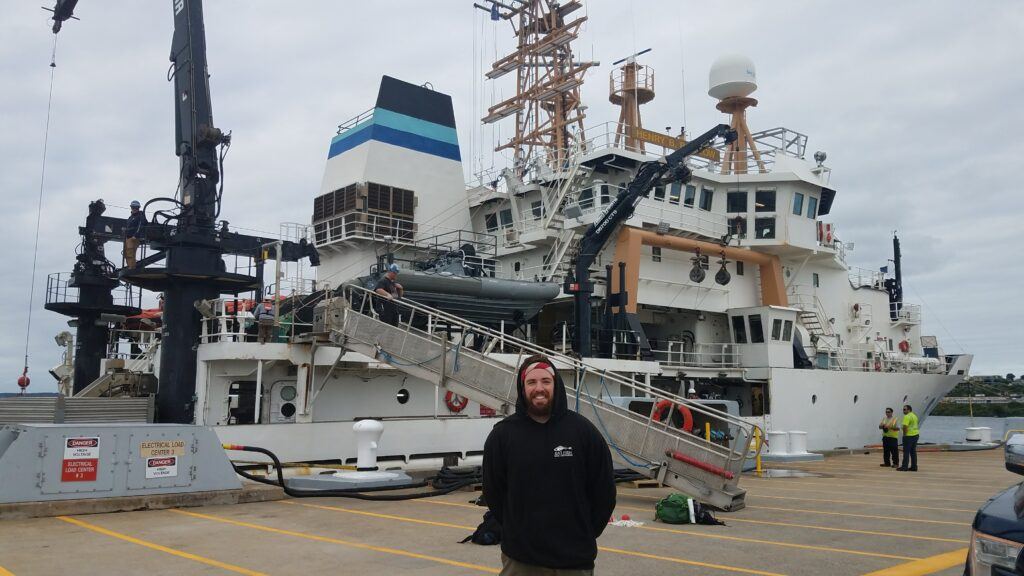
Ivy Blog
No Victory Too Small in Brain Tumor Treatment
- May 17, 2024
- Ivy Center
- Posted in Patient Support

Zach Fyke was biking down a steep, rocking mountain when he accidentally rode off a boulder, losing control and landing right on his head. He knew it was bad. He went straight to the emergency room. Doctors found no evidence of a concussion but they did find a mass in his brain.

An MRI showed a large tumor on Zach’s brain stem. A biopsy of the tumor revealed a grade 2 astrocytoma. Surgery was not recommended but Zach would start a regimen of chemotherapy and radiation to shrink the tumor.
The diagnosis was a shock. Zach was a healthy, active 26-year-old enjoying an exciting career as a marine biologist with NOAA Fisheries, surveying shellfish off the coast of Massachusetts. The rounds of radiation, followed by a year-long chemotherapy cycle, took a toll on Zach’s physical and mental health. He experienced anxiety, depression and weight gain.
His neuro-oncologist, Dr. Yoshie Umemura, then at the University of Michigan, where Zach was receiving treatment, was a voice of comfort and encouragement. She walked Zach and his family through every step of his brain tumor journey.
“I have seen Zach pick himself up from both physical and metaphorical falls many times since I met him. His strength to move forward when everything seems to be against him is truly inspiring,” says Dr. Umemura, now the chief medical officer of the Ivy Brain Tumor Center. “When I have a hard day, it’s patients like him who keep me going.”
Ringing the bell after brain cancer
When Zach completed radiation treatment, he rang a bell to signify the end of treatment. It was a moment he’ll never forget. Zach was looking forward to completing the year of chemotherapy, but when he reached that milestone, there was no bell to ring and nothing to mark the end of treatment. It was a letdown. Zach and his family decided to change that. They got a large gold bell and sent it to Dr. Umemura to place in her neuro-oncology clinic.

The Victory Bell now hangs in the clinic at the Ivy Brain Tumor Center at Barrow Neurological Institute. Patients can ring it to commemorate a goal achieved or a milestone met.
“I think that celebrating achievements and milestones in brain cancer treatment is important because treatment affects us all differently. The emotional, physical, psychological and spiritual aspects of what we go through is a unique experience for each one of us,” Zach says.
Patients can ring the bell for any achievement they feel is worthy. No victory is too small, especially for those on a brain cancer journey.
“I want patients to be able to ring this bell to celebrate all their victories and achievements in life. It can be from completing a prescribed cycle of chemotherapy, making it back out to their favorite coffee shop for the first time, checking something off a bucket list, or anything else that should be celebrated. Nothing is too small,” Dr. Umemura says.
Zach has completed treatment and is back in good health. He continues to see specialists, like a psychologist and a nutritionist, who are helping him with all aspects of his health. He gets regular monitoring and scans every four months to watch for signs of tumor recurrence.
The healing power of community and adventure

Zach has found support and community with young adult cancer survivors groups. He went whitewater rafting with First Descents, a support group that offers outdoor activities for young adults impacted by cancer and other serious health conditions. The group has taken him on rock climbing, surfing and kayaking adventures. Zach has become somewhat of an advocate for new patients to connect to programs like First Descents. He compiled a list of support groups to share with those who are newly diagnosed.
“It’s so important to be together with other survivors, it’s powerful,” Zach says. “You’ve just been dealt the hardest hand, you need support.”

This story is for general health information only and is not meant to be used as medical advice, diagnosis or treatment. Please consult your physician or healthcare provider before beginning any treatment protocol or with any questions. This story reflects the health status of this particular patient at the time the story was written and photographs were taken. The patient’s condition may have changed over time.
